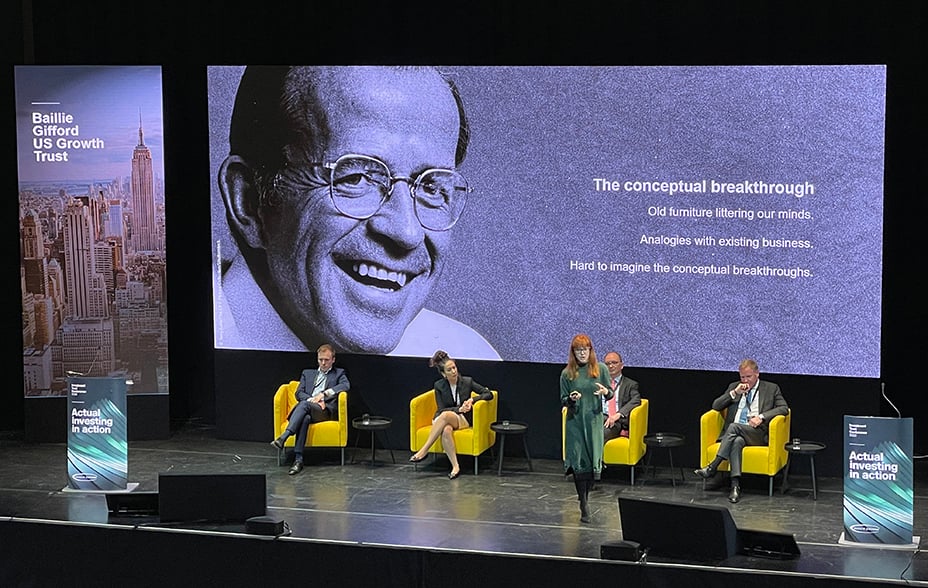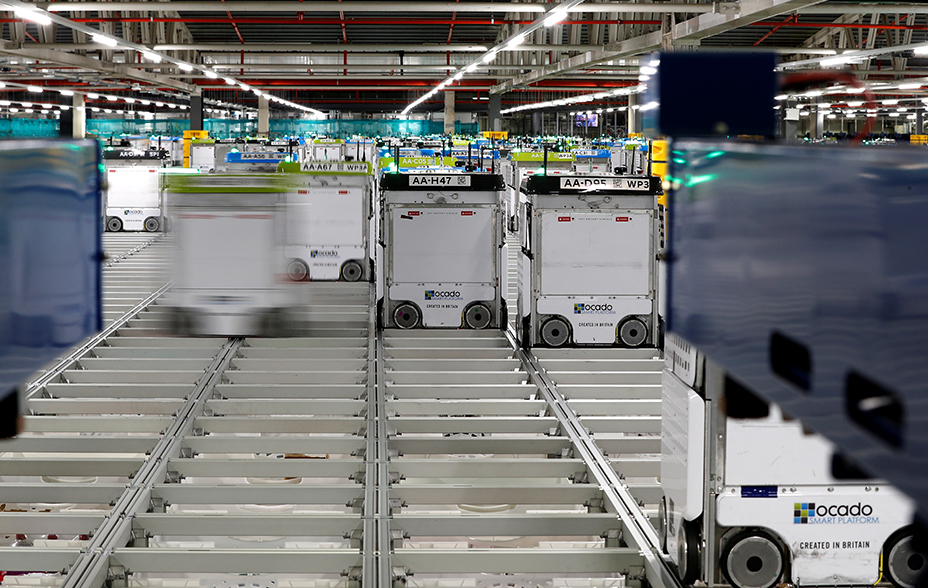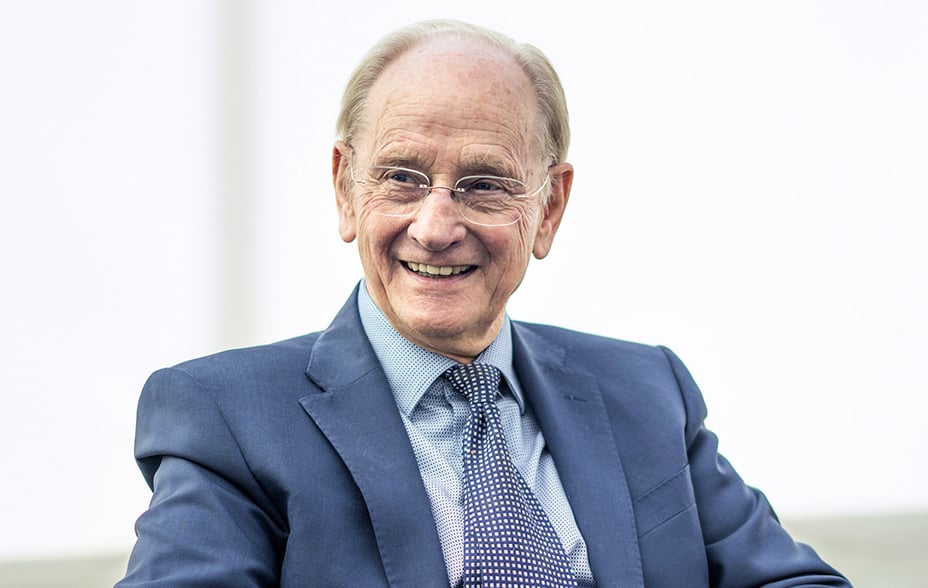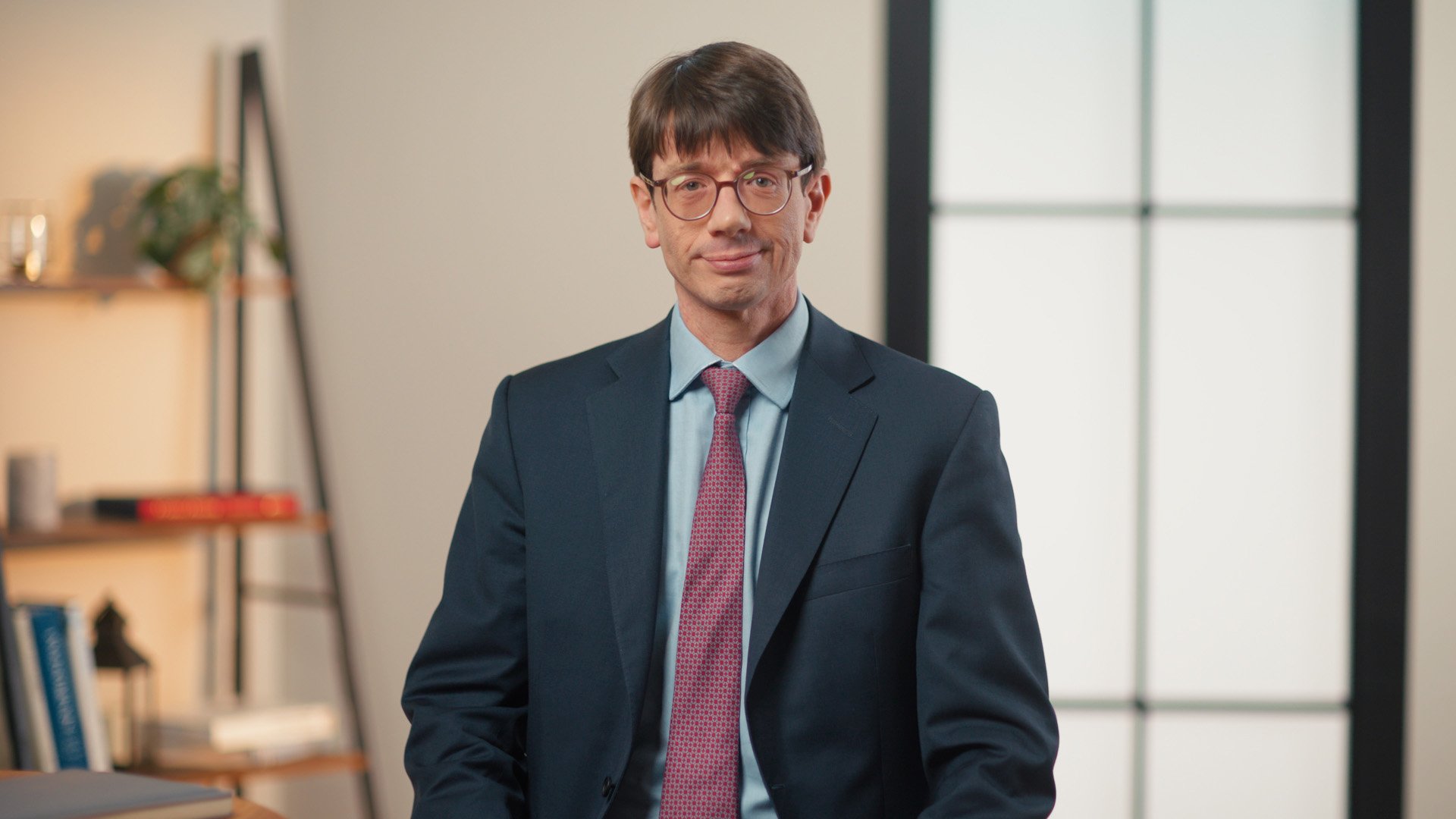Key points
- Market volatility is uncomfortable, but unavoidable for successful long-term growth investing
- Baillie Gifford’s investment philosophy remains to seek out fast-growing companies and hold them for long periods
- Structural change creates opportunities across a broad range of industries for innovation-led companies

Please remember that the value of the investment can fall and you may not get back the amount invested.
Past performance is not a guide to future returns.
Baillie Gifford’s style of growth investing will inevitably result in periods of volatility. The market's preference for profit today over future growth prospects has damaged the share price performance of many of the companies held in the investment trusts managed by Baillie Gifford.
Opening Baillie Gifford’s Investment Trust Conference 2022 in Edinburgh’s Assembly Rooms, James Budden, Director of Marketing and Distribution, acknowledges the investment backdrop is difficult for clients. But Budden says the firm’s investment philosophy remains the same:
“Baillie Gifford’s approach to investing is grounded in the belief that over the long term, share prices follow fundamentals. The companies that grow their businesses and profits most successfully tend to generate the strongest returns for shareholders. Our fund managers seek out fast-growing companies and hold them for long periods to capture the benefits of that growth.”
Out with the old
The investment managers are focusing on staying on the right side of structural change. Covid has accelerated the adoption of many of the long-term trends already underway in society. This covers digitalisation, the energy transition and the further development of personalised healthcare.
These are all areas that Kirsty Gibson, joint manager of the US Equity Growth Trust, highlights.

She warns, “the challenge is not getting new ideas in, it’s getting those old ideas out. Because with old ideas, come assumptions about how things should be, rather than what they could become.”
And it is the long view of what companies could become that excites her. She shares examples where the hypotheses are less certain and more future-orientated: Snap, famous for its Snapchat app, Discord, the group-chat social media platform, and Blockstream, whose technology makes it easier to use cryptocurrencies such as Bitcoin for everyday financial transactions.
Like Gibson, Peter Singlehurst, manager of The Schiehallion Fund, is enthused by the future that is already here. Borrowing from science fiction writer William Gibson, he notes, “the future has arrived. It’s just not evenly distributed.” His task, he says, as an investor, is to identify those futures before they become ubiquitous.
Thus, Epic Games, home of the video game Fortnite, provides Singlehurst with a window on one of many futures as yet distributed, the metaverse.
By providing primary capital to high-growth private companies, the Schiehallion Fund “fuels the growth and development of these businesses, favourably twisting the odds and magnitude of success. Not only are we learning about the futures that are already here, but we’re also providing the resources for their distribution.”
From virtual worlds to other worlds, Luke Ward’s sights are set further afield as he speculates on the future of space. The deputy manager of Edinburgh Worldwide Investment Trust sings the praises of SpaceX and what it has achieved. Fully reusable, Ward believes its latest rocket in development, the Starship, “is going to transcend the industry from being government-led to business-led. It’s a radical improvement in affordability which will unlock the next stage of growth there.”
While the next decade is likely to see major growth in satellite communication, the possibilities thereafter continue to grow. As affordability and availability increase, space tourism becomes feasible, as does manufacturing in space.
Manufacturing could become space’s largest market, given the billions of dollars industries pour into recreating space-like conditions on earth in strictly controlled environments known as cleanrooms. These are strictly controlled environments built for use in semiconductor manufacturing, pharmaceuticals and any other field where the product is highly sensitive to contaminants.
Change is accelerating and broadening out
Closer to home, Lawrence Burns, deputy manager of Scottish Mortgage Investment Trust, sees increasing computer power broadening out to create large pools of disruption. He singles out Ocado, the online UK grocer, as a company to watch. It hopes to shape the future of food distribution with its software and robotics platform.
Burns suggests, “If technology keeps improving, driven by increasing computing power, machine learning and robotics, it may become cheaper to distribute food digitally through Ocado’s fulfilment centres rather than a store. This will be a gamechanger, both for it and society.”


The Monks Investment Trust manager, Spencer Adair, agrees that many industries will find themselves disrupted. He suggests, “What’s interesting at the moment is that change is accelerating and broadening out.” This means that companies that can harness innovation could benefit from the change.
At first glance, the French conglomerate Nexans might not seem to fit this mould. However, it is selling off its legacy assets to focus where it has a high market share driven by its technological lead (it holds more than 1,900 patents).
Its high-voltage cabling will help the transition to wind and solar energy generation. Lack of change in industries also provides opportunities. Keystone Positive Change Investment Trust invests with the premise that doing something good for society and doing well financially go together.
Climate change is one of the biggest threats society faces. Joint manager Lee Qian anticipates that the private company Climeworks, a pioneer in direct carbon removal, has a bright future. The company has already opened its first commercial-scale direct carbon removal plant in Iceland that removes carbon dioxide from the atmosphere and permanently stores it underground.
Relationships matter
Iain McCombie and Milena Mileva, joint managers of the Baillie Gifford UK Growth Trust, also highlight how they gain from building relationships with management over time. Sir David McMurty, co-founder of engineering firm Renishaw, may not court the investment circuit, but he makes time to talk with Mileva at investor days.
Describing Renishaw as one of “Britain’s greatest innovative companies” and McMurty as “one of Britain’s greatest industrialists of the past 50 years,” McCombie recognises that it's Baillie Gifford’s large and longstanding presence as shareholders that opens doors.
As well as increasing understanding of Renishaw and its opportunities, Milena and McCombie relish the insight they can glean from an individual at the forefront of his industry.

The relationships between managers at Baillie Gifford matter too. Matthew Brett and Praveen Kumar highlight the diversity of the Japanese Equities Team, which has over 100 years of combined investment experience. Each investor within the team has a slightly different preference for growth companies which leads to well-rounded portfolios.
Kumar draws attention to camping kit manufacturer, Snow Peak, a holding in Baillie Gifford Shin Nippon. The company “has a near cult-like following” for its high-end camping products in Japan and is expanding in the US. Snow Peak is run by Lisa Yamai, the granddaughter of the founder. In her early 30s, Yamai's background in design fosters genuine product innovation, allowing the company to charge a premium for its products.
In comparison, one area that Brett is looking for includes companies in The Baillie Gifford Japan Trust “that combine the manufacturing know-how with a bold growth way ahead of them”. The increase in mechanisation and automation in rice cultivation creates a “very, very large” growth opportunity in Asia. Tractor manufacturer Kubota is well-positioned to benefit. Held in the Japan Trust for over a decade, he expects the company will be held for many years more.

Growth investing in all its forms
Managers are keen to stress that growth investing comes in all shapes and sizes. Investing in an asset class where drawdowns are the norm, Sophie Earnshaw, co-manager of the Baillie Gifford China Growth Trust, acknowledges that it has been a turbulent and painful 12 months for investors in China.
However, she reminds the audience, “Looking through short-term volatility is incredibly important. As is being able to commit your capital for at least five, ideally 10 years or longer. So, is China investable? Yes, if one has the appropriate risk tolerance and time horizon.”
For those that do, she highlights China’s scale, speed of growth and innovative companies, such as food delivery company Meituan. It is already delivering over 30 million meals per day, compared to the paltry 715,000 meals Grubhub, the US leader, delivers.
For the greater good
All the investment trusts managed by Baillie Gifford, regardless of whether they have an impact objective, give credence to environmental, social and governance (ESG) matters and actively engage with portfolio holdings.
Roderick Snell, portfolio manager of Pacific Horizon Investment Trust, is careful not to discount “grubby materials” on ESG principles – without commodities, such as copper and nickel, the green transition and reaching net-zero cannot happen.
Many companies involved in green technologies view being “extremely socially conscious” as integral to their brands. This puts pressure on material suppliers to source ethically. Those that do are likely to see their products trade at a premium. Snell suggests that some of the best opportunities may lie in miners on an improving trend.
Vedanta Resources, an Indian mining company, was managed poorly in the past. In response to a move toward privatisation, and in conjunction with other large shareholders, Snell petitioned management that the best value generation lay in improving operations. Over the past 12–18 months, the company has done so and has seen a rising share price.
James Dow, joint manager of The Scottish American Investment Company (better known as ‘SAINTS’), describes the framework the Trust has developed. Integral to the investment process, it helps determine how ESG matters could affect a company’s ability to deliver the steadily compounding growth SAINTS thrives on.
The framework has been useful for “constructive engagement with our holdings on the most material ESG topics we think they are facing”. For example, this includes conversations with Nestlé about its packaging, carbon footprint and emissions.

The map is not the territory
The final words go to Scottish Mortgage’s Tom Slater and Chris Davies, manager of the Baillie Gifford European Growth Trust.
On paper, Europe is weighed down by political infighting that stands in the way of progress, its largest companies are “a bit old-fashioned, a bit dull and not that innovative”. But that’s not the territory that Davies recognises.
Indeed, according to him, “The European opportunities set for investors, we think, is broader and richer than it’s ever been.” The increase in newly-minted unicorns – private companies valued at over $1 billion – signals that the European market is not the innovation backwater some think it is. To conclude, it is worth repeating Slater’s comments: “We have confidence in owning some of the best growth companies in the world, companies run by exceptional leaders, companies with extremely strong financial positions.”
Long-term growth investing has its contours, with share prices rising and falling in the short term. Despite the current volatility, the conference confirms that investment trusts remain an exciting territory for shareholders to explore.
Important information
This communication was produced and approved in June 2022 and has not been updated subsequently. It represents views held at the time of presentation and may not reflect current thinking.
This communication should not be considered as advice or a recommendation to buy, sell or hold a particular investment. This communication contains information on investments which does not constitute independent investment research. Accordingly, it is not subject to the protections afforded to independent research and Baillie Gifford and its staff may have dealt in the investments concerned. Investment markets and conditions can change rapidly and as such the views expressed should not be taken as statements of fact nor should reliance be placed on these views when making investment decisions.
Baillie Gifford & Co Limited is authorised and regulated by the Financial Conduct Authority. Baillie Gifford & Co Limited is the authorised Alternative Investment Fund Manager and Company Secretary of the Trust.
All data is source Baillie Gifford & Co unless otherwise stated.
The Trusts are listed on the London Stock Exchange and is not authorised or regulated by the Financial Conduct Authority.
Key Information Documents for the trusts are available on the Baillie Gifford website.
This information has been issued and approved by Baillie Gifford & Co Limited and does not in any way constitute investment advice.
22148 10011383



